- Home
- Company
- Amino Acid Encyclopedia
- Find Out the Secrets of Amino Acids!
- Aging and Amino Acids
Aging and Amino Acids
Using amino acids to reduce muscle loss and improve weakened immunity with aging

Using Amino Acids to Maintain Diminishing Muscle Mass
As people get older they often notice they have less muscle mass and energy. Many assume that this is due to old age and that there is nothing they can do about it. The loss of muscle that happens when people age is called "sarcopenia." Sarcopenia very often makes it harder to live an independent life. It can cause the elderly to go out less, and can increase the risk of falls and broken bones. Addressing sarcopenia is important for preventing lower quality of life (QOL).
Exercise and good nutrition are essential for preventing and treating sarcopenia. It is very important that people exercise safely and effectively, in a way that is appropriate for their strength and ability. For nutrition, the Japanese Ministry of Health, Labor and Welfare and other experts recommend actively eating meals full of high-quality animal proteins, especially foods like meat, fish, eggs and milk.
Together with eating animal proteins amino acids are being closely studied as a nutritional strategy for sarcopenia. Amino acids are nutrients that make up the proteins in muscle. They include branched-chain amino acids (BCAAs) that are especially plentiful in muscle. BCAAs help make muscle protein and prevent the breakdown of muscle protein. Amino acids that cannot be made by our bodies and must be taken in from food are called "essential amino acids." More and more evidence suggests that consuming essential amino acids, including BCAAs, is effective in preventing sarcopenia. A study was conducted on muscle gain in older adults. It showed that compared with consuming protein from whey (the liquid left over from making cheese and other products) consuming a formula of nine essential amino acids with a high percentage of the BCAA leucine produced more muscle protein gain compared with a control group. In addition, older adults who regularly consumed this leucine-rich essential amino acid formula with light exercise enjoyed increased muscle mass and strength and improved exercise function, including walking faster.

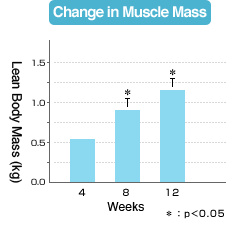
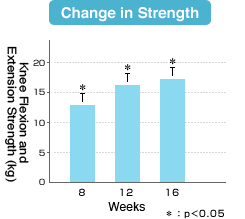
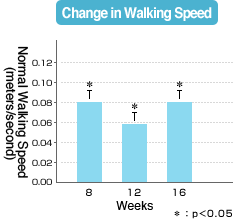
Borsheim et al., Clin. Nutr., 27, 189-195 (2008)
Among BCAAs leucine is particularly effective in promoting the making of muscle protein. This means that it is important to consume more leucine as we get older. We should actively and regularly consume high quality foods that are rich in BCAAs such as milk and other dairy products, meat, fish and eggs. We should also efficiently take nutrients that are needed by the body, such as leucine.
Safety of Amino Acids
Amino acids are nutrients that make up the proteins in our body. They have long been used in many aspects of our everyday lives including as food seasonings. Amino acids are safe to consume. Amino acids have almost no effect on blood sugar levels. When healthy adults take an excess of amino acids their body simply metabolizes them and expelled the amino acids that doesn’t need as waste. Amino acids are very safe.
Amino Acids Help Restore Immune Response
As we get older, our immune response weakens and we are more likely to catch colds and other illnesses. The symptoms also become more severe. Older people do not get enough protection even with flu vaccinations because their immune response is too weak. A study was conducted to investigate the effects of cystine and theanine on immune response when elderly residents of a nursing home were given the flu vaccine. The group that did not take cystine and theanine after being vaccinated showed almost no improvement in immune response but the group that did take cystine and theanine showed a significantly improved immune response. These results indicate that weakened immune response with aging can be restored by consuming amino acids.

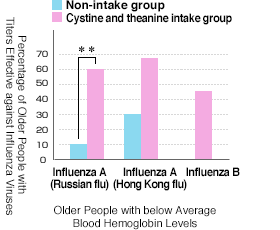
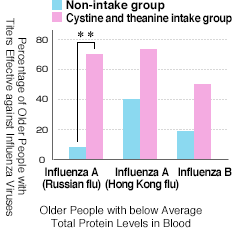
Miyagawa et al., Geriatr. Gerontol. lnt., 8, 243-250, 2008 .

